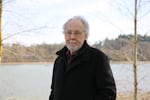Oregon essayist and author Barry Lopez died this week at the age of 75. NPR first confirmed his death on Saturday.
Lopez was born in New York but had lived in Oregon since 1968. He was most well known for his book “Arctic Dreams,” which won a National Book Award in 1986.
Lopez’s work often focused on the landscapes and places where he traveled. He was diagnosed with cancer in 2013 but continued writing. He remained one of Oregon’s most celebrated writers and thinkers.
We listen back to an interview from last spring with the author. His most recent book, “Horizon,” knits together his decades of travel all around the world. It’s a book full of wonder and sadness, hope and despair, about the natural world — and the way humans are changing it.

Oregon writer Barry Lopez's latest book is "Horizon." It focuses on his travels over the last half century to six different parts of the world: the Arctic Circle, Antarctica, Australia, Kenya, the Galapagos Islands, and the Oregon Coast.
Allison Frost / OPB
“Pay attention to small things,” Barry Lopez reminds himself. And so often, he does. He stares at rocks. At model ships and silver coins. At dead animals and live ones.
And after paying attention to these small things, he thinks about big ones: about empire and capitalism. About the genocides of indigenous peoples and the destruction of their cultures. About cruelty and despair — but also about beauty, kindness and hope.
Lopez is the author of sixteen books, and the recipient of numerous awards, fellowships and prizes. His latest book is called “Horizon.” It’s an autobiographical reflection on a career devoted to traveling to every corner of the world — from the poles to the equator, and mountains to deserts.
“What is going to happen to us?” he asks. “What is our fate if we do not learn to speak to each other over our cultural divides, with an indifferent natural world bearing down on us?”
His Favorite Place In The World Is His Home On The McKenzie River
“That’s where I’ve had the longest conversation with a physical place," he said. "And I know as the years go by, there’s always something I’ve never thought of or imagined that will blossom there on day when I least expect it.”
He Spends A Lot Of Time Intensely Looking
"I don't think my way of writing is to search for something that I could frame as an answer," he said. "Most of it is just sitting. And watching. And waiting. And If you do that enough, eventually something you never thought of will emerge. And that ties to something else. So, I don't write quickly, and I don't think very quickly. I watch for things that most of us ignore … My work is to turn on the intensity control knob and bring it up to max out and just sit there with it."
On Why He Loves Antarctica
“If you’re based at McMurdo base, which is like a mining town or something ... five minutes outside of town, you see the face of God without trying. It is a place that is, I would say the word would be: resplendent. And I also found, wherever I was in Antarctica, the absence of time.”
He Has Learned How To Pay Attention From Indigenous Teachers
“I had been to many places, I thought, but actually hadn’t been there at all, because I was paying more attention to what I was thinking, than I was to what was in front of me … When you’re traveling with traditional people in their landscape, hardly anybody talks. Why? It’s because when you create language about an incident, you reduce the incident to a place where it has meaning instead of a place where it stimulates.”
How He Balances Hope And Despair
“Throughout the book I’m trying to be honest about the darkness I encountered. But I’m also trying to emphasize that it is cowardly to let it all be dark. You have to have some movement of the heart that re-opens the dark world that we despair over to possibility, especially the possibility of another understanding," he says. "The attention that I try to pay to darkness and to places we call 'the light' is intentional ... What you have to be careful of is to never let your spirit of life become paralyzed by the darkness that you’re faced with.”
On His Terminal Cancer Diagnosis
“What’s really happened with that diagnosis is that I’ve found a kind of depth of compassion for the world that I hadn’t felt before. Almost everywhere I go now I want to embrace a stranger and ask how they’re doing.”
To hear more from the “Think Out Loud” conversation with Lopez, including his feelings about clearcuts, how he listens to music — and a surprise ringtone interruption — click “listen” on the player at the top of the page.
